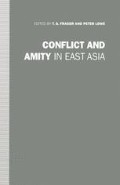Abstract
This is a brief essay in neglect. It asks whether President Truman’s personal role in the conduct of US policies towards Japan deserves reconsideration after two generations of near silence. It is a topic that continues to evoke considerable heat at least in private among senior participants. Correspondence with presidential aides and General MacArthur’s staff suggests that claims and counter-claims remain firmly held and might now be brought before the bar for possible adjudication against the available archival and secondary sources.1
Access this chapter
Tax calculation will be finalised at checkout
Purchases are for personal use only
Preview
Unable to display preview. Download preview PDF.
Notes
For a recent survey of the literature see John. W. Dower, ‘Occupied Japan and the cold war in Asia’, in Michael J. Lacey (ed.), The Truman Presidency (Cambridge, 1989), footnotes pp. 370–3. A more exhaustive treatment can be found in chapter 8, ‘The Allied Occupation of Japan, 1945–1952’ of Sadao Asada’s edited bibliographical guide Japan and the World, 1853–1952 (Columbia, 1989).
On British reservations see R. Buckley, Occupation Diplomacy: Britain, the United States and Japan, 1945–1952 (Cambridge, 1982).
The issue is discussed at length in Leon V. Sigal’s Fighting to a Finish (Ithaca, 1988). See also Buckley, ‘Waiting till Midnight: Japan’s Reluctance to Surrender and its immediate post-war behaviour’, The Journal of Social Science, (ICU), October 1980.
See, for example, Shiozaki Hiroaki, ‘The Round Table Movement and the Path to the Japanese-Anglo-American War’, in a special number of Kokusai seiji (International Relations) entitled ‘From the Sino-Japanese War to the Japanese-Anglo-American War’, vol. 91, May 1989.
See entry for 1 May 1945 in Walter Millis (ed.), The Forrestal Diaries (London, 1952), p. 67. Secretary Forrestal’s reservations over a Carthaginian occupation of Japan were not out of any apparent sympathy for Japan but concerned ‘our political objectives in the Far East’.
Richard F. Haynes, The Awesome Power: Harry S. Truman as Commander-in-Chief (Baton Rouge, 1973), p. 59.
See Marc S. Gallichio, The Cold War Begins in Asia (New York, 1988) for an examination of the Truman administration’s Asian actions in 1945.
On the Japanese surrender in the region see Louis Allen, The End of the War in Asia (London, 1976); over Hong Kong see R. Buckley, ‘From Reoccupation to EXPO: Hong Kong-Japanese relations, 1945–1970, Journal of Social Science (ICU), October 1989. Anti-colonialism may have been a lesser factor in Truman’s behaviour than it was in the thinking of Roosevelt.
See Michael Schaller, The American Occupation of Japan (Oxford, 1985), p. 21. Presumably Truman feared that the immediate consequences of not appointing MacArthur outweighed any long-term difficulties.
Truman diary entry, 5 January 1946; whether this unsent letter was shown to Byrnes remains unclear. Robert H. Ferrell, Off The Record (Harmondworth, 1980), p. 80.
The phrase is Iriye Akira’s. See Iriye, The Cold War in Asia (Englewood Cliffs, 1974).
On respect for spheres of influence see John Gaddis, The Long Peace (Oxford, 1989), p. 239. On British dissatisfaction see Buckley Occupation Diplomacy, pp. 48–55.
James F. Byrnes, Speaking Frankly (London, 1948), p. 216.
W. Averell Harriman and Elie Abel, Special Envoy to Churchill and Stalin (London, 1976), p. 514. The American interpreter present felt that Stalin had not forgiven the US refusal to allow a Soviet claim to Hokkaido.
Only when it was apparent that international cooperation was improbable and major differences within the US bureaucracy were solved could peace become a reality. See R. Buckley, ‘Joining the Club: The Japanese Question and Anglo-American Peace Diplomacy, 1950–1951’, Modern Asian Studies, April 1985.
D. Clayton James, The Years of Mac Arthur, vol. III, Triumph and Disaster 1945–1964 (Boston, 1985), p. 17.
It is doubtful, however, if Schaller’s view that ‘during 1949 and 1950, MacArthur hung on in Tokyo as something of a figurehead, although he and the administration sustained the fiction of his authority’ is entirely the case. See Michael Schaller, Douglas MacArthur (New York, 1989), p. 157.
Feary ‘Summary of negotiations leading up to the conclusion of the Treaty of Peace with Japan’, 18 September 1951, in Thomas W. Burkman (ed.) The Occupation of Japan: The International Context (Norfolk, Va., 1984), p. 280.
On Rusk see Thomas J. Schoenbaum, Waging Peace and War (New York, 1988), pp. 226–9.
Ronald W. Pruessen, John Foster Dulles: The Road to Power (New York, 1982), p. 457.
Editor information
Editors and Affiliations
Copyright information
© 1992 T.G. Fraser and Peter Lowe
About this chapter
Cite this chapter
Buckley, R. (1992). A Particularly Vital Issue? Harry Truman and Japan, 1945–52. In: Fraser, T.G., Lowe, P. (eds) Conflict and Amity in East Asia. Palgrave Macmillan, London. https://doi.org/10.1007/978-1-349-12160-1_8
Download citation
DOI: https://doi.org/10.1007/978-1-349-12160-1_8
Publisher Name: Palgrave Macmillan, London
Print ISBN: 978-1-349-12162-5
Online ISBN: 978-1-349-12160-1
eBook Packages: Palgrave History CollectionHistory (R0)

